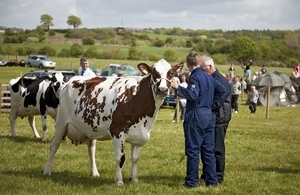News story: Latest UK Aid Match round calls to charities tackling wildlife crime and deforestation
The Department for International Development has confirmed today (Thursday 11th October) the latest £20 million round of UK Aid Match, inviting applications from charities working to achieve sustained poverty reduction and to achieve the Global Goals, and particularly encouraging proposals from wildlife and conservation charities.
The announcement came as further evidence of DFID’s commitment to spend its foreign aid budget on programmes that protect and conserve the natural world as well as helping the world’s poorest people.
International Development Secretary, Penny Mordaunt said:
UK Aid Match gives the British public a chance to see the money they donate to their most passionate development causes matched pound-for-pound by the government.
We owe it to future generations for UK aid to work alongside some of our most innovative and hard-working charities to tackle the scourge of the illegal wildlife trade and protect our natural environment. I want to encourage our partners to look to UK Aid Match as a way of furthering their efforts to do this and connecting with the British public.
To do so is a win for the public; a win for the world’s poorest people; and a win for wildlife.
UK Aid Match brings charities, the public and UK government together to collectively change the lives of some of the world’s poorest people. It also gives the British public an opportunity to engage with international development issues and have a say in how UK aid is spent.
In the last five years, UK Aid Match has supported 42 charities and run projects in 27 countries, which have benefitted more than 25 million of the world’s poorest people. The government has matched every public donation made to these charities pound for, helping them go further in changing and saving lives.
To find out more and apply for UK Aid Match please visit: www.ukaidmatch.org.
Each charity appeal must run for up to three months and raise up to a maximum of £2million, subject to a due diligence assessment.
NOTES TO EDITORS
- Applications for the next round of proposals opens on the 22 October and guidance will be available on the Aid Match website from 12 Oct.
- UK Aid Match brings charities, the British public and the UK government together to collectively change the lives of some of the world’s poorest and most vulnerable people.
- It is designed to provide opportunities for the UK public to engage with international development issues and have a say in how UK aid is spent, whilst boosting the impact of the very best civil society projects to reach the poorest people in developing countries.
- For every £1 donated to a UK Aid Match charity appeal, the government will also contribute £1 of UK aid, to help these projects go further in changing and saving lives. UK Aid Match is funded from the international development budget, for donations made by individuals living in the UK.
- For more information on the fund, or to make an application, please visit the UK Aid Match website
Illegal Wildlife Trade Conference, London, 11-12 October 2018
- With over 1000 delegates, the Illegal Wildlife Trade Conference will be the largest of its kind ever to be held. 84 countries have confirmed that they will be sending delegations, spanning Africa (26); Americas (14); Asia and Oceania (17); Europe (23) and the Middle East (4).
The conference will focus on three themes:
- Tackling the illegal wildlife trade as a serious organised crime: strengthening law enforcement.
- Building coalitions: engaging the private sector, NGOs and academia; harnessing technology and innovation.
- Closing markets for illegally traded wildlife products: building on the Chinese ivory trade ban.
